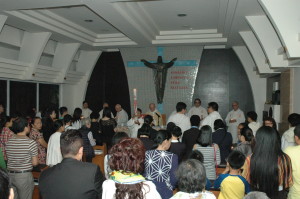SOME POINTS OF REFLECTION
Tonight’s liturgical celebration, so rich and full of symbols, memories and history, is a summary of the history of God’s plan for our salvation, carried out, in its last stage, by Jesus of Nazareth, the Son of God become man, our Savior.
Why, we asked yesterday, should all have to end up that way, in such a shameful kind of death? Why was Jesus killed? Why was he condemned to death, anyway? We can advance, among others, two answers. One answer, because of the way He lived. Ever since the very beginning of his public life, Jesus found himself in disagreement with the way the standing authorities were interpreting God’s law, depriving it of its spirit and humanity; thus, he became a dangerous man to be get rid of… The other answer is because of his absolute love to his Father and his fidelity to the mission entrusted by the Father to him, the Redemption of humanity. ‘In accordance to his own plan God had already decided that Jesus would be handed over to you: and you killed him by letting sinful men crucify him. But God raised him from death, setting free from its power, because it was impossible that death should hold him prisoner†(Acts, 2, 23-24)
What did J’s resurrection mean for him?
*The definitive “yes†of God to his Son and to the new Kingdom established by Him. For that, God “glorified†Him.
*The approval and rehabilitation of the person of Jesus and of his “causeâ€.
*The confirmation of all that Jesus did and preached.
What did it mean to his disciples?
“Why do you seek among the dead him who is alive?†(Lk 24, 5)
After an initial stage of confusion, bewilderment and amazement, a conscience was created among them that the Lord apparently had risen. Then, a conviction that he was alive; and finally, due to the work of the Holy Spirit promised by Jesus, they felt and experienced in their interior a new life, full of joy, that led them to realize that it came from the Lord, and, therefore, that the Lord was risen and alive. It all had happened as their Master had foretold them.
The Resurrection of Jesus for us
“In our union with Jesus Christ, he raised us up with him†(Ef 2, 6).
The experience of Jesus is for us a sign: what Jesus lives now is what God had promised for the end of time. In the risen Christ we can see, with joy and hope, where we are going. Jesus’ resurrection helps us to discover the meaning of our personal and collective human existence. He is the first fruit, “the first one to rise from death†(Acts 26, 23), an anticipation of our own resurrection.
We have not, individually or collectively, seen the Lord; we have not seen the empty tomb, the numerous apparitions to different persons… Besides, the reality of the resurrection, being a divine event, takes place beyond and above the realm of our reasoning; we have nothing to say about it. But we did have an encounter with or by the risen Lord. We cannot see it, or touch it, or, perhaps, explain it, etc., because it is above our senses, the same way as we cannot see or touch, or show or demonstrate the divine life given to us on the day of our baptism. Yet, we are bearers of his grace, and therefore, witnesses and sharers of his Resurrection.
How are we to live Jesus’ resurrection?
“He is going to Galilee ahead of you; there you will see him, just as he told you†(Mk 16, 7)
That is now our task–mission in the present world: to be witnesses of Jesus, not only of his historical presence, but also of his relevance in our lives. To be witnesses in our Galilee of today, that Jesus is alive, present in our world, and that Jesus was resurrected by God so that we can resurrect with him.
José Luis de Miguel, O. P.
 St. Dominic’s Priory
Macau, April 2015.


